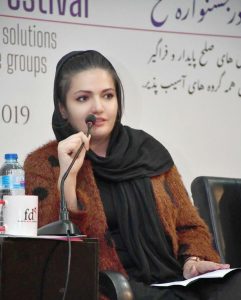Women are the main victims of Afghanistan’s negotiating team weakness

Many experts, especially women’s rights activists believe that Afghanistan’s negotiating team combination, knowledge, and ability to negotiate are among the factors that can influence their success. The weakness of the negotiating team, however, will be detrimental to women more than any other group.
In an interview with the CSHRN, Ms. Salimi said that the negotiating team of Afghanistan should not accept any restrictions with regards to women. Women are not willing to accept any restrictions that the Taliban might impose on their rights. She added that the world’s great powers should pressure the Taliban to respect women’s rights.
Network: What effect does the presence of women in peace negotiation have?
Salimi: In retrospect, because of the patriarchal structure of society, men have never been able to represent women. Therefore, the widespread presence of women in this process can guarantee the protection of women’s rights. Afghan women have the ability to play a direct role in determining their own future. Ms. Salimi added that women should defend their rights enshrined in the constitution and international treaties, and participate in all political processes, including the peace negotiations, which has a direct impact on maintaining their freedom and achievements.
Network: What are the important demands of women from peace talks?
Salimi: The most important demand for women is that all their political, social, and economic achievements be preserved because they do not want to retreat to the past. Women want to play an active role in all areas of society and be economically self-sufficient so that they can contribute to the needs of the family alongside men.
Network: What is your general view about peace talks?
Salimi: Although I am not optimistic about the outcome of negotiations with the Taliban who has always carried out killings, and the war will continue if no attempt is made to achieve peace. It remains to be seen to what extent can the peace talks, with the support of the government and the international community, defend the rights and civil liberties of the Afghan people, respect women’s rights, the civic values of the people, and freedom of expression. According to Ms. Salimi, it remains to be seen to what extent the peace negotiation can act as a force against the Taliban and change their view of women so that they do not fall victim to peace talks.
Network: What guarantees the Taliban’s commitment?
Salimi: The government, as a party to the dialogue and other countries involved in the peace talks must remain supportive of women. Another major concern is that some citizens support extreme ideologies.
Network: Do you think the negotiating team has the capacity to defend women’s rights?
Salimi: Unfortunately, the Taliban have a radical ideology and may be able to use it to influence people in the political structure of the government, which is concerning. According to Ms. Salimi, she hopes that along with members of the negotiating team–who she believes have political affiliations—experts from Islamic countries will also be present as advisers to persuade the Taliban to respect women’s rights.